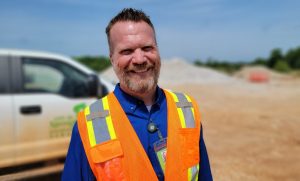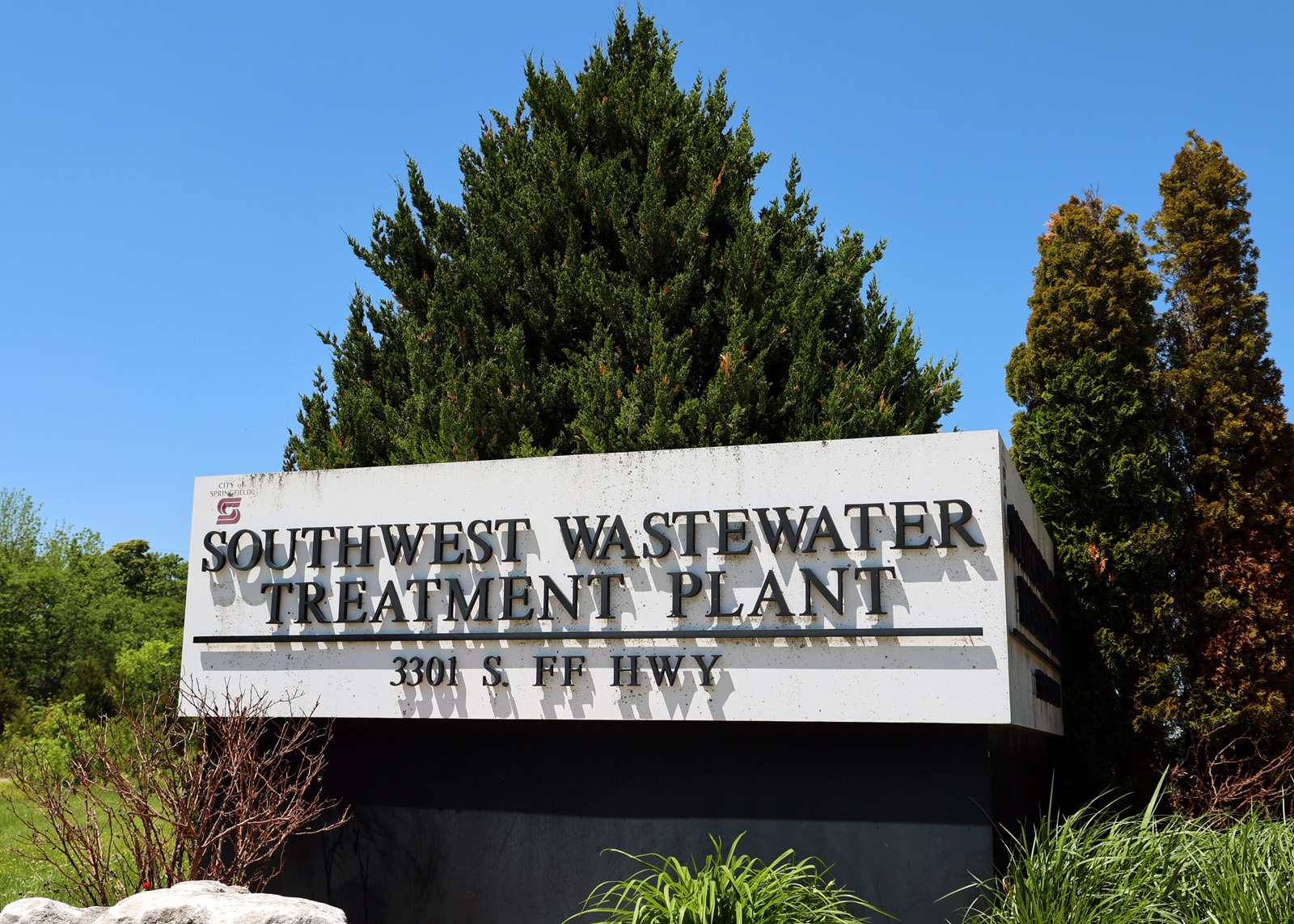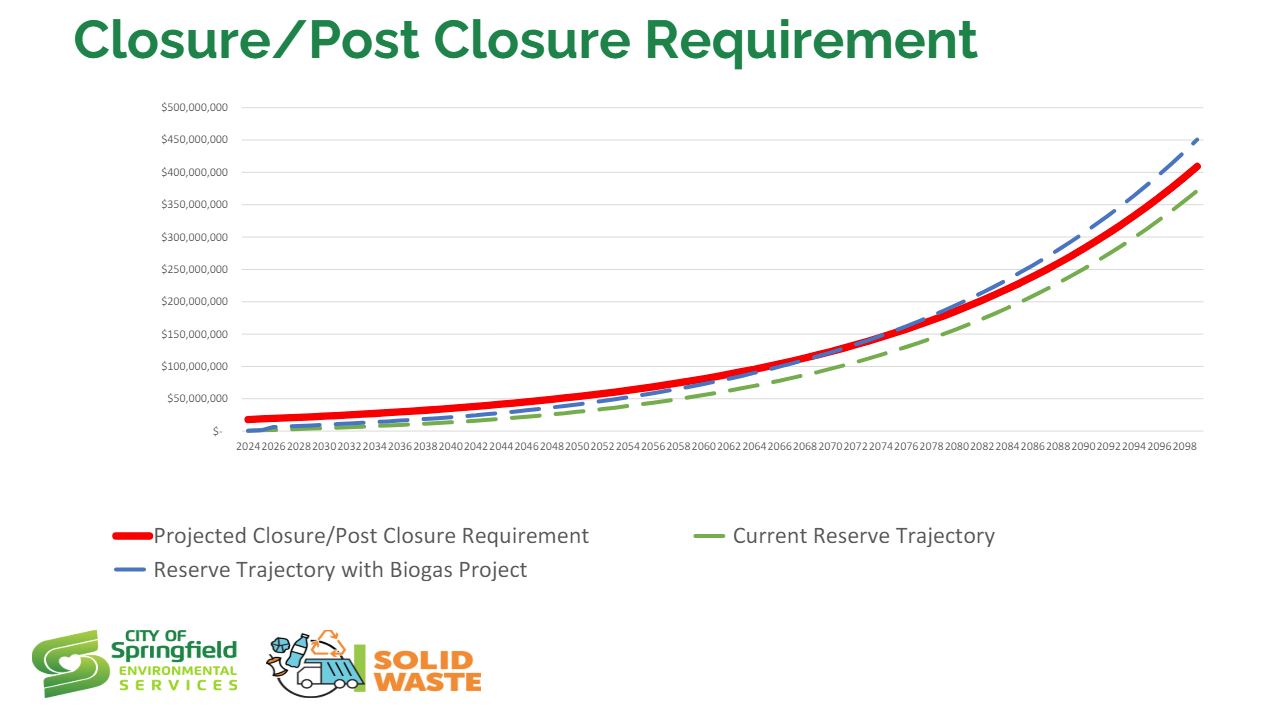Springfield’s natural gas pipelines could soon be supplied with refined biogas produced at the city’s Noble Hill Sanitary Landfill and Southwest Wastewater Treatment Plant.
With the $31.6 million Renewable Natural Gas (RNG) project, Springfield’s Department of Environmental Services aims to not only refine and reuse biogas produced from waste, but also monetize the resource.
The revenues generated from the renewable natural gas could be used to pay back debt service associated with the project, plus finance wastewater treatment costs and the cost of the eventual closure and maintenance of the landfill.
“That’s why we think this biogas project could be a huge asset, and a huge opportunity for us as a community to help meet this need,” Erick Roberts, assistant director of Springfield Environmental Services, told Springfield City Council members at a June 4 study session.

While funding is still uncertain, Springfield Environmental Services hopes to select a firm to design and construct the project in October of this year, and then bring the facilities online by late 2025 or early 2026. The project emerged from a 2022 feasibility study and was further set in motion with the City Council’s approval of the design-build project delivery method in March of this year.
Project offers ‘next stage' of treatment
While Environmental Services uses biogas to offset electricity costs at its own facilities, the renewable natural gas project involves advanced treatment that will allow the gas to be mixed with other fossil fuels, according to assistant director of Environmental Services Ron Petering.
Biogas is produced through an anaerobic process in which various organic materials are broken down into a gas that is comprised of 45-65% methane. The project will allow the city to convert biogas into renewable energy by removing additional pollutants, carbon dioxide and other gasses to increase the methane content to 90% or greater.
“Once you have RNG, you can inject that in a pipeline, you can transport that long distances,” Petering said. “And instead of kind of trading one energy source for another one, like we're doing now in trading gas for electricity, you can continue to do that or you can just make that available to the gas companies who serve consumers, and allow them to use that for home heating, and other industrial uses.”
While potential revenues are based on a variety of conditions, even the most conservative estimates could help pay down project costs and fund a variety of future projects.
Grants, tax credits could fund project
Of the $31.6 million estimated project cost, about $26.2 million is needed to produce renewable natural gas at the landfill. The remaining $5.4 million is required for the construction and installation of biogas equipment at the Southwest Wastewater Treatment Plant.
The operation and maintenance of the new facilities is estimated to cost $3 million a year, with $2.5 million of the cost associated with the landfill.
“The number is higher at the landfill, in part because the landfill produces a lot more gas than the Southwest Treatment Plant facility will be,” Petering said. “Also, the landfill is farther away from any pipeline that we can inject into.”
Petering said they expect to use a trucking system to transport the gas from the landfill, which is built into the annual costs.
While eventual revenues could help pay off any financing mechanisms associated with the project, Environmental Services is exploring various funding sources, including a grant program that could cover up to 70% of the capital expenses.

Springfield’s renewable natural gas project is among the projects included in the state of Missouri’s application for Climate Pollution Reduction Grant funding from the Environmental Protection Agency.
While unsure how much money — if any — Springfield will be awarded through the grant program, Petering said the state has made a commitment to cover up to 70% of the project.
“That is going to be contingent, obviously, on them being successful with their application, period, in getting anything,” Petering said. “And then what is unknown is if they were successful, but they don't get all of what they've asked for, whether they're going to just drop the level of participation for everybody to try to help support the same palette of projects or whether some projects may drop off, and some communities may opt out, because maybe the funding level drops to where they don't want to pursue a project.”
The City of Springfield could also receive as much as 30% of the total capital invested in the project in tax credits through a renewable energy tax credit program.
Revenues could fund additional projects, closure of landfill
Excluding annual expenses, the project could generate anywhere from $4 million to $19 million annually based on a range of market conditions, Petering said. The city could sell the physical gas to companies and utilities like City Utilities, or sell renewable identification numbers, or credits, to obligated or voluntary parties to maintain regulatory compliance or support renewable energy.
Under the most conservative estimate, the city could pay back any debt issued for the biogas project in about eight years. Higher revenue levels and additional funding sources could drop the payback period by several years.
In addition to helping pay off any debt issued for the project, the revenue generated could fund “all kinds of needs,” Petering said, including regulatory requirements of the Supplemental Overflow Control Plan, which requires a remaining $240 million investment in the city’s wastewater collection and treatment system through 2035.
The funds could also be used to reinvest in the Southwest Wastewater Treatment Plant, expand the capacity of the Northwest Wastewater Treatment Plant and meet evolving regulatory requirements concerning clean water.
The renewable natural gas produced at the landfill could also fund long-term costs associated with the eventual closure of the landfill and subsequent maintenance of the site — estimated at over $400 million by 2098.

While the city extended the life of the Noble Hill Sanitary Landfill by 75-100 years by adding an additional 42 acres of disposal area in 2019, Environmental Services is preparing for the eventual closure of the landfill. Revenue collected from the renewable natural gas project could shore up the reserve funds necessary to cover and monitor the landfill.
Roberts estimates they could continue producing renewable natural gas from the landfill for a couple of decades after its closure.
“If we are able to successfully project off the ground, that shifts that funding trajectory to the blue line,” Roberts explained. “And you can see that that crosses the need for the closure/post closure [of the] landfill, very fortuitously, about the time that the landfill is projected to close, which is the time that we would need the majority of that funding in place.”
Renewable natural gas revenues could also help address a variety of other challenges facing the department, involving emerging contaminants, evolving regulations, recycling goals and service improvements.

